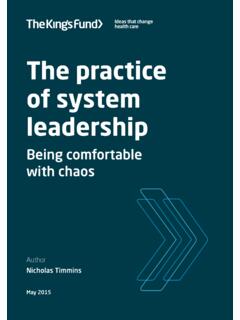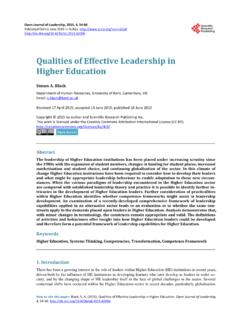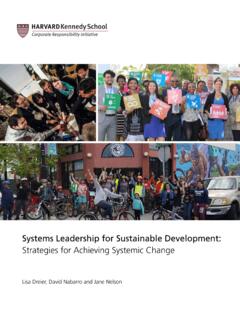Transcription of Educational leadership and management: theory, policy, and ...
1 South African Journal of EducationCopyright 2007 EASAVol 27(3)391 406 Educational leadership and management: theory, policy, and practice Tony is great interest in Educational leadership in the early part of the 21stcentury because of the widespread belief that the quality of leadership makesa significant difference to school and student outcomes. There is also increasingrecognition that schools require effective leaders and managers if they are toprovide the best possible education for their learners. Schools need trained andcommitted teachers but they, in turn, need the leadership of highly effectiveprincipals and support from other senior and middle managers.
2 While the needfor effective leaders is widely acknowledged, there is much less certainty aboutwhich leadership behaviours are most likely to produce favourable examine the theoretical underpinnings for the field of Educational leadershipand management, assess different leadership models, and discuss the evidenceof their relative effectiveness in developing successful significance of Educational leadership and managementThere is great interest in Educational leadership in the early part of the 21stcentury. This is because of the widespread belief that the quality of leadershipmakes a significant difference to school and student outcomes.
3 In many partsof the world, including South Africa, there is recognition that schools requireeffective leaders and managers if they are to provide the best possible educa-tion for their learners. As the global economy gathers pace, more governmentsare realising that their main assets are their people and that remaining, orbecoming, competitive depends increasingly on the development of a highlyskilled workforce. This requires trained and committed teachers but they, inturn, need the leadership of highly effective principals and the support ofother senior and middle managers (Bush, in press).
4 The field of Educational leadership and management is pluralist, withmany competing perspectives and an inevitable lack of agreement on the exactnature of the discipline. One key debate has been whether Educational leader-ship is a distinct field or simply a branch of the wider study of author s view is clear and consistent, having been articulated for morethan 20 years. While education can learn from other settings, educationalleadership and management has to be centrally concerned with the purposeor aims of education. These purposes or goals provide the crucial sense ofdirection to underpin school management.
5 Unless this link between purposeand management is clear and close, there is a danger of managerialism , astress on procedures at the expense of Educational purpose and values (Bush, 1999:240). The process of deciding on the aims of the organization is at the heart ofeducational management. In most schools, aims are decided by the principal,392 Bushoften working in association with the senior management team (SMT) andperhaps also with the school governing body (SGB). However, school aims arestrongly influenced by pressures from the external environment, and parti-cularly from the expectations of government, often expressed through legisla-tion or formal policy statements.
6 Schools may be left with the residual task ofinterpreting external imperatives rather than determining aims on the basisof their own assessment of learner needs. The key issue here is the extent towhich school managers are able to modify government policy and developalternative approaches based on school-level values and vision. Do they haveto follow the script, or can they ad lib? (Bush 2003:1-2).Distinguishing Educational leadership and managementThe concept of management overlaps with that of leadership , a notion of greatcontemporary interest in most countries in the developed world.
7 It is alsoreflected in contemporary South African discourse, notably in the establish-ment of the Matthew Goniwe School of leadership and Governance (MGSLG)in 2003 and in the title of the new pilot national qualification for schoolprincipals, the Advanced Certificate in Education: School leadership , beingpiloted from 2007. However, despite these developments management remainsthe dominant term in the debate about aspects of school (1988:xx) provides one of the clearest distinctions between leader-ship and management. He links leadership with change while managementis seen as a maintenance activity.
8 He also stresses the importance of bothdimensions of organisational activity:By leadership , I mean influencing others actions in achieving desirableends. Leaders are people who shape the goals, motivations, and actionsof others. Frequently they initiate change to reach existing and new leadership .. takes .. much ingenuity, energy and is maintaining efficiently and effectively current organisa-tional arrangements. While managing well often exhibits leadership skills,the overall function is toward maintenance rather than change. I prizeboth managing and leading and attach no special value to either sincedifferent settings and times call for varied et al.
9 S (2001) study of twelve effective schools leads to the discussion ofseveral dilemmas in school leadership . One of these relates to management,which is linked to systems and paper , and leadership , which is perceived tobe about the development of people. Bush (1998; 2003) links leadership tovalues or purpose while management relates to implementation or technicalissues. leadership and management need to be given equal prominence if schoolsare to operate effectively and achieve their objectives. Leading and managingare distinct, but both are important .. The challenge of modern organisationsrequires the objective perspective of the manager as well as the flashes ofvision and commitment wise leadership provides (Bolman & deal , 1997:xiii-xiv).
10 393 leadership and managementLeithwood et al. (1999) make the important point that, in practice, prin-cipals in their day-to-day work are rarely aware of whether they are leadingor managing; they are simply carrying out their work on behalf of the schooland its learners. However, the nature of that work should reflect the schoolcontext and, in particular, its needs at any one time. For example, SouthAfrica s underperforming schools (Ministerial Review, 2004; Pandor, 2006)require a greater emphasis on basic management, making the organisationfunctional, rather than a visionary approach.
















